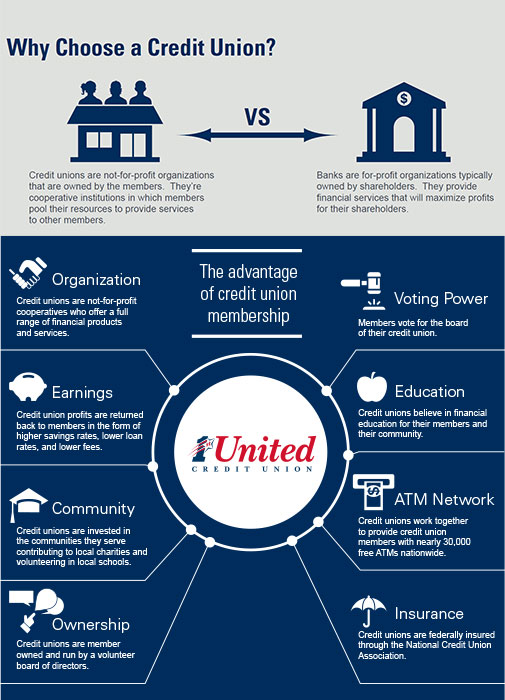Credit Union in Wyoming: Discover the Benefits of Member-Focused Financial
Credit Union in Wyoming: Discover the Benefits of Member-Focused Financial
Blog Article
The Ultimate Overview to Comprehending Lending Institution
:max_bytes(150000):strip_icc()/dotdash-credit-unions-vs-banks-4590218-v2-70e5fa7049df4b8992ea4e0513e671ff.jpg)
Credit scores unions stand as unique monetary entities, rooted in concepts of shared assistance and member-driven procedures. As we browse with the complexities of credit history unions, an informative journey awaits to drop light on these member-focused establishments and how they differ from conventional financial institutions.
What Are Cooperative Credit Union?
Credit unions are member-owned banks that provide an array of financial services to their participants. Unlike conventional financial institutions, cooperative credit union operate as not-for-profit companies, indicating their main emphasis gets on offering their participants instead of making the most of earnings. Members of a cooperative credit union typically share a common bond, such as working for the same company, coming from the very same community, or being component of the very same company.
Among the essential benefits of credit score unions is that they commonly supply greater rate of interest on interest-bearing accounts and lower rates of interest on loans compared to financial institutions. Federal Credit Union. This is due to the fact that cooperative credit union are structured to benefit their members straight, allowing them to hand down their earnings in the form of far better prices and fewer fees. Additionally, cooperative credit union are known for their customized customer support, as they focus on constructing partnerships with their participants to comprehend their one-of-a-kind monetary demands and goals
Background and Advancement of Cooperative Credit Union
The origins of member-owned financial cooperatives, understood today as cooperative credit union, trace back to a time when communities looked for options to typical banking organizations. The idea of lending institution come from the 19th century in Europe, with Friedrich Wilhelm Raiffeisen frequently attributed as the leader of the cooperative banking activity. Raiffeisen founded the very first acknowledged credit rating union in Germany in the mid-1800s, stressing community support and self-help concepts.
The advancement of cooperative credit union proceeded in The United States and copyright, where Alphonse Desjardins developed the first lending institution in copyright in 1900. Quickly after, in 1909, the initial united state cooperative credit union was developed in New Hampshire by a group of Franco-American immigrants. These very early cooperative credit union operated the basic principles of shared assistance, autonomous control, and participant ownership.
Over time, cooperative credit union have expanded in appeal worldwide due to their not-for-profit structure, concentrate on serving participants, and providing competitive financial products and solutions. Today, lending institution play an essential role in the economic sector, offering available and community-oriented banking options for individuals and organizations alike.

Membership and Qualification Requirements
Membership at a credit scores union is generally limited to individuals meeting particular eligibility requirements based on the establishment's starting concepts and regulative requirements. Some credit score unions may only serve individuals that live or work in a particular area, while others may be customized to employees of a certain business or members of a particular organization.
In addition, lending institution are structured as not-for-profit organizations, indicating that their key goal is to serve their members as opposed to create earnings for shareholders. This focus on member service usually converts into even more customized attention, lower fees, and competitive interest prices on financial savings and car loans accounts. By fulfilling the eligibility standards and ending up being a member of a lending institution, people can access a variety of financial products and solutions tailored to their particular requirements.
Solutions and Products Used
Among the crucial elements investigate this site that sets cooperative credit union apart is the varied variety of economic product and services they supply to their members. Lending institution commonly offer typical banking services such as financial savings and checking accounts, lendings, and credit scores cards. Members can also gain from investment solutions, consisting of pension and economic preparation assistance. Lots of credit report unions provide affordable rate of interest rates on savings accounts and finances, along with reduced charges contrasted to conventional banks.
In addition, cooperative credit union usually supply convenient online and mobile financial choices for participants to conveniently manage their financial resources. They might use benefits such as shared branching, permitting members to access their accounts at various other lending institution throughout the country. Some credit scores unions additionally provide insurance coverage items like auto, home, and life insurance policy to aid members secure their assets and loved ones.

Advantages of Banking With Debt Unions
When taking into consideration financial establishments, exploring the advantages of banking with credit unions discloses one-of-a-kind benefits for members seeking personalized service and competitive prices. Unlike large banks, credit score unions are member-owned and prioritize structure solid partnerships with their members. Generally, banking with a credit scores union can provide a much more individualized, economical, and member-centric economic experience.
Verdict
In final thought, credit rating unions stand out as member-owned financial establishments use this link that focus on serving their participants over taking full advantage of profits. With origins dating back to 19th century Europe, credit score unions follow principles of mutual aid and participant possession.
Credit history unions are member-owned economic organizations that supply a variety of banking solutions to their members. The idea of credit rating unions stem in the 19th century in Europe, with Friedrich Wilhelm Raiffeisen frequently credited as the leader of the cooperative financial motion.The evolution of credit scores unions continued in North America, where Alphonse Desjardins developed the very first debt union in copyright in 1900. Credit scores unions commonly provide typical banking services such as cost savings and checking accounts, finances, and debt cards.When thinking about economic establishments, my website exploring the advantages of banking with credit report unions discloses distinct advantages for participants looking for customized service and affordable prices.
Report this page